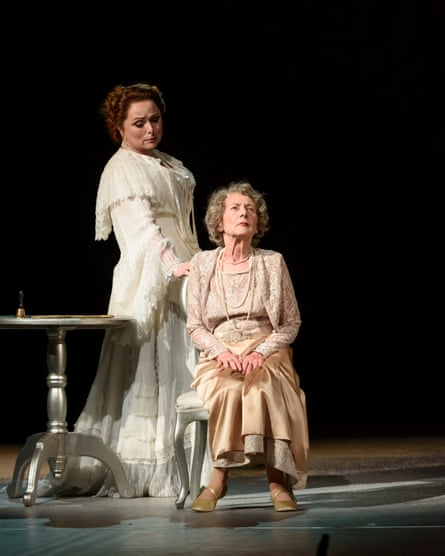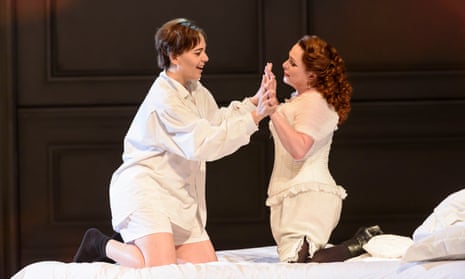In Richard Strauss’s Der Rosenkavalier, the mix of farce and deeply philosophical musing on the nature of ageing requires an approach that is neither ludicrous nor reverential. Olivia Fuchs’s staging for Welsh National Opera – following a co-production with Theater Magdeburg that premiered there three years ago – strikes a good balance. Fuchs certainly gives a more serious context to the Marschallin’s rumination on time passing by adding the figure of the old Marschallin, a ghostly persona revisiting her own story of 38 years before. Margaret Baiton captures expressively a benign – rather than threatening – presence, but there are chilling frissons when the Marschallin of 1911 – this production is set in the year of the opera’s first performance – is confronted by the spectre of what she will become.
Rebecca Evans, in her role debut, brings a strong sense of the Marschallin’s sensibilities: not only her perception of human foibles, but also her sense that the world as she knows it is about to fall apart. Niki Turner’s set implies the demise of the Austro-Hungarian empire in the collapsing ceiling and the grand chandelier; particularly poignant is the Marschallin’s singing of her vain attempt to stop all the clocks in the house. Even in the wake of their passion, it is the inevitability of change that the Marschallin points out to her lover Octavian, little imagining that she will soon relinquish him to young Sophie. So, it is not simply in structural terms that the fulfilment of her predictions in the final act makes the work’s bittersweet ending work so well: the transcendent beauty of Strauss’s music, particularly its matchless trio, marries the hope of the young lovers’ union with the Marchallin’s acceptance of the march of time.

Brindley Sherratt’s portrayal of the thwarted Baron Ochs – as oafish as his name – is not as crude a caricature as some, and he rightly made his excellent bass the focus of attention. Given the nature of the work’s message, it felt appropriate that, with Evans’s graceful assumption of the older woman’s role, Sophie was sung by a young soprano whose career looks to follow a similarly stellar trajectory. Louise Alder’s sparkling soprano has great poise and assurance and her warm reception was richly deserved. Canadian mezzo Lucia Cervoni is a credible Octavian, mannish enough in mannerism and breadth of tone, although she was less convincing when disguised as the chambermaid.
A major plus of fixing the work in 1911 is that Strauss’s exuberant waltzes – anachronistic in the 18th-century setting he and librettist Hugo von Hofmannsthal originally conceived – feel so decadently evocative here. Conductor Tomáš Hanus’s handling of these – and of the humour and emotion of the score – is wonderfully sympathetic; it often felt as though Strauss’s tone poems were coming from the pit, while the WNO orchestra were in extremely fine form.

Comments (…)
Sign in or create your Guardian account to join the discussion